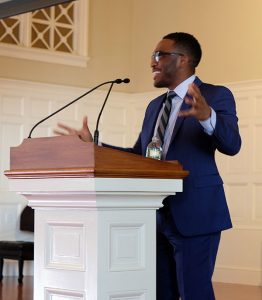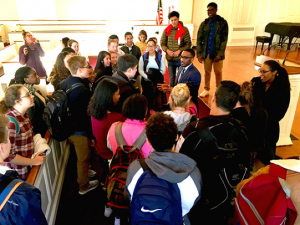 This Martin Luther King Jr. Day, speaker Nyle Fort had a message for Williston Northampton School students: Don’t be taken in by the feel-good “lullaby” that usually passes for celebrating the legacy of Dr. King, which he called, “a sweet song sung by defenders of the status quo to keep us asleep.”
This Martin Luther King Jr. Day, speaker Nyle Fort had a message for Williston Northampton School students: Don’t be taken in by the feel-good “lullaby” that usually passes for celebrating the legacy of Dr. King, which he called, “a sweet song sung by defenders of the status quo to keep us asleep.”
The third Monday in January has come to be associated with community service projects to honor the late civil rights advocate. Fort said he didn’t want to diminish the idea of service. However, he quoted Dr. King who said, “True compassion is more than flinging a coin to a beggar; it comes to see that an edifice which produces beggars needs restructuring.”
In that vein, Fort asked students to look critically at their country. Why do we have poverty, war, injustice, he asked. Why does the United States have 5 percent of the world’s population, and 25 percent of its prison population? Why, of the 2.7 million incarcerated people in the U.S., are 1 million black, even as sociologists who study crime say that blacks and whites commit crimes at similar rates?
He illustrated this last problem: As a PhD student at Princeton University who commutes from a housing project in Newark, he’s seen police in his mostly poor black neighborhood stop and frisk people (including him) and arrest others for petty drug crimes. Meanwhile, at Ivy League Princeton, he’s seen students use illegal drugs at parties with no judicial consequences. “Why are they not arrested?” he asked.
‘Love Tells the Truth’
Fort said he is points out shortcomings like these in our society because he loves this country. His mother would tell him the truth, he said, if his outfit wasn’t quite right, because she loved him and wanted him to look his best. “Love tells the truth,” he said. For the same reason, he confronts “the ugliness and the nastiness that sits at the heart of this democracy.” He cited author James Baldwin as someone who loved America so much he criticized it, demanded it become its best. Likewise, Fort says, he, a minister, criticizes the Christian church for turning a blind eye to slavery, and the black Christian church for denying women the chance to be pastors. Both institutions have treated poorly members of the LGBT community, he said.

Fort described Dr. King as someone whose mythical reputation approaches that of Santa Claus. However, King, the man, was anti-imperialist and a Democratic Socialist. He was in favor of universal employment and he disapproved of the Viet Nam war. These stances made him less popular near the end of his life, but he kept struggling for justice. Fort said it is important that we don’t look at someone like King as a messiah. There will be no messianic figure to create a just world, Fort said. And he paused, driving home the point: We all have to act to transform the world into what we want it to be.
Fort took questions from students. Prompted by one audience member’s question, he named some texts that informed his activism. They are:
- “The Fire Next Time” by James Baldwin, an author who Fort said humanized black people, not flattening them into one monolithic entity
- “Between the World and Me” by Ta-Nehisi Coates
- “From #BlackLivesMatter to Black Liberation” by Keeanga-Yamahtta Taylor
- “Freedom Dreams: The Black Radical Imagination” by Robin D. G. Kelley
- “The New Jim Crow: Mass Incarceration in the Age of Colorblindness” by Michelle Alexander
- “Beloved” by Toni Morrison
An international student asked how to take these concepts to other countries. Fort reminded her that Dr. King was thinking globally and traveled the world to bring a message of universal human rights.
Fort also has trotted the globe (from Ferguson to Israel and Palestine) carrying this message. He has spoken at various academic, cultural, and religious institutions including Harvard University, University of Amsterdam, the Malcolm X and Betty Shabazz Center, and the historic Riverside Church. His writings are featured in several academic presses including Harvard Journal of African American Public Policy and Socialism and Democracy, as well as various popular media outlets including The Guardian, HuffPost, and The Root, where he made its 2015 100-most-influential list.
Recently, Fort joined 300 grassroots leaders from around the globe to participate in the Vatican’s III World Meeting of Popular Movements (WMPM).
Fort is pursuing a doctorate in Religion and African American Studies at Princeton. He received a B.A. in English from Morehouse College and a Master of Divinity from Princeton Theological Seminary.
Activism Always
In his final moments at the podium, Fort reminded students to fold activism into whatever profession they choose. There’s room for making the world better no matter what you do, he said. “If you’re a doctor,” he said, “be a doctor who serves underserved people.” After he finished, students gave him a sustained standing ovation.
Students seemed to respond positively to his visit. A crowd surrounded Fort at the conclusion of his address, asking questions and sharing stories. One student was heard to say, “That was the coolest thing I ever heard!”
Advisors will hold follow-up discussions with students during advisory meetings this week to carry the conversation forward.

